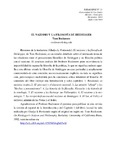Mostrar el registro sencillo del ítem
El nazismo y la filosofía de Heidegger
| dc.rights.license | http://creativecommons.org/licenses/by-nc-sa/3.0/ve/ | |
| dc.contributor.author | Rockmore, Tom | |
| dc.date.accessioned | 2017-01-13T22:51:55Z | |
| dc.date.available | 2017-01-13T22:51:55Z | |
| dc.date.issued | 2016-01 | |
| dc.identifier.issn | 1316-7939 | |
| dc.identifier.uri | http://www.saber.ula.ve/handle/123456789/42878 | |
| dc.description.abstract | Resumen de la traductora (Gladys L. Portuondo): El nazismo y la filosofía de Heidegger, de Tom Rockmore, es un estudio detallado sobre el intrincado tema de las relaciones entre el pensamiento filosófico de Heidegger y su filiación política con el nazismo. El acucioso análisis del Profesor Rockmore pone en evidencia la imposibilidad de separar la filosofía de la política, lo que no significa reducir aquella a esta última -siendo la filosofía de Heidegger un caso particular y ampliamente controvertido de esta conexión, no necesariamente explícita en toda su significación, pero tampoco inadvertida para la conciencia crítica inherente al filosofar. El contenido del libro incluye una Introducción y ocho capítulos: 1. Revelando en nazismo oculto; 2. El giro nazi y el discurso rectoral; 3. La opinión "oficial" y los "Hechos y pensamientos"; 4. La historia de la filosofía: Nietzsche y la historia de la ontología; 5. El nazismo y las Beitrage zur Philosophie; 6. El nazismo y la tecnología; 7. La recepción francesa del nazismo de Heidegger; 8. El Ser, el Volk y el nazismo; además de las Notas y el Index. | es_VE |
| dc.language.iso | es | es_VE |
| dc.rights | info:eu-repo/semantics/openAccess | |
| dc.title | El nazismo y la filosofía de Heidegger | es_VE |
| dc.title.alternative | On Heidegger's Nazism And Philosophy | es_VE |
| dc.type | info:eu-repo/semantics/article | |
| dc.description.abstract1 | Summary by the translator (Gladys L. Portuondo): On Heidegger's Nazism and Philosophy, by Tom Rockmore, is a detailed study on the intricate issue of relations between the philosophical thought of Heidegger and his political affiliation with Nazism. The thorough analysis of Professor Rockmore highlights the inseparability of philosophy and politics, which does not mean reducing the former to the latter -while Heidegger's philosophy can be regarded as a particular and widely controversial case in this connection, whose significance is not always necessarily explicit -although it is not unnoticed by the critical consciousness in philosophy. The content of the book includes an introduction and eight chapters: 1. Revealing Concealed Nazism; 2. The Nazi Turning and Rectoral Address; 3. The "Official" View and the "Facts and Thoughts"; 4. The History of Philosophy: Nietzsche and the History of Ontology; 5. Nazism and the Beiträge zur Philosophie; 6. Nazism and Technology; 7. The French Reception of Heidegger's Nazism; 8. Being, the Volk and Nazism; in addition to the Notes and Index. | es_VE |
| dc.description.colacion | 119-164 | es_VE |
| dc.description.email | rockmore@duq.edu | es_VE |
| dc.identifier.depositolegal | 199802ME321 | |
| dc.publisher.pais | Venezuela | es_VE |
| dc.subject.centroinvestigacion | Centro de Investigaciones Jurídicas (CIJ) | |
| dc.subject.facultad | Facultad de Ciencias Jurídicas y Políticas | es_VE |
| dc.subject.publicacionelectronica | Revista Dikaiosyne | |
| dc.subject.seccion | Dikaiosyne: Traducción | es_VE |
| dc.subject.thematiccategory | Ciencias Jurídicas y Políticas | es_VE |
| dc.subject.tipo | Revistas | es_VE |
| dc.type.media | Texto | es_VE |
Ficheros en el ítem
Este ítem aparece en la(s) siguiente(s) colección(ones)
-
Dikaiosyne - Nº 031 Año XIX
enero - diciembre 2016


